sample from HTML program and PDF book
1. You should make every effort to stay within any word limits that have been set for an essay assignment. One important part of the exercise is that you should produce an answer to the question within set limits.
2. You will not normally be penalised if your essay is a little too short – so long as your argument is written in a concise style and you have covered all the topics which a full answer requires.
3. Similarly, an essay that is just slightly too long will not normally be penalised – so long as all your arguments are relevant to the point of the question.
4. However, you should avoid producing essays which greatly exceed the word limit. The longer you go on writing, the more likely you are to stray away from the point of the question. You will not normally be rewarded just for the quantity you produce.
5. An essay which seriously exceeds the word limit (say, by more than twenty or thirty percent) could be returned to you by your tutor as unacceptable. The argument could be made that you are not staying within the set limits, and you are possibly taking an unfair advantage over other students who have stayed within them.
6. Quotations should not normally be counted as part of the word limit – but the total amount of material from secondary sources should be so small that the proportion is insignificant.
7. You do not need to make a detailed count of every word (or pencil totals in the margin as ‘proof’). Use the word-count feature of
your word-processor to get an idea of the total. If it doesn’t have a counter, just make the following calculation for a rough estimate of your total word count:
words per line × lines per page × pages
8. If an essay is too long before you produce your final draft, its length may be reduced by rigorous editing. Consider some of the following possibilities.
9. Eliminate any repetitions in your basic argument. If you cover the same point from more than one perspective, retain only the most important parts of the discussion, and delete the others.
10. You might consider shortening your introduction, certainly if goes on for much more than 200 words. In some extreme cases it might even be better to go straight to your argument.
11. Check your prose style and try to make the expression of your argument as concise as possible. If necessary, shorten the length of your sentences by removing any words which are not essential to the argument. Cut out anything which introduces a conversational tone.
12. Reduce the number of illustrative examples. Each major point of your argument should normally be illustrated by one or [at the most] two examples of evidence which are then analysed or discussed. If you have more, you should just retain the most convincing and relevant. Eliminate the others.
13. Shorten any illustrative quotations to the absolute minimum. Most essays should not need long quotations from secondary sources – if only because it is your own argument which is more important. Select just those few words which make your point.
14. If on the other hand your final efforts have produced an essay which is shorter than the required length, you obviously need to do some extra work on it. Consider the following steps.
15. Go back to the start of the essay planning process and generate more ideas and topics on the subject in question. Try to think of new approaches or aspects of the subject which you might have ignored or forgotten.
15. Look closely at the question again. Ask yourself if you have followed all its instructions and covered all that it has asked for.
16. Make sure that you have provided an explanatory introduction and conclusion to the essay. Don’t waffle just for the sake of filling up the space. Introduce your argument succinctly and make sure that you have explained its relevance to the original question.
17. It might be that you have produced an argument which is not well enough illustrated by examples which are analysed and discussed. Make sure that you have sufficient evidence and explanatory examples to prove your point. Do not let an argument stand alone without proof.
18. Make sure that you have explained the relevance of your argument to the question which was originally posed. In other words, you must demonstrate the connection between your examples and the subject in question.
© Roy Johnson 2003
Buy Writing Essays — eBook in PDF format
Buy Writing Essays 3.0 — eBook in HTML format
More on writing essays
More on How-To
More on writing skills

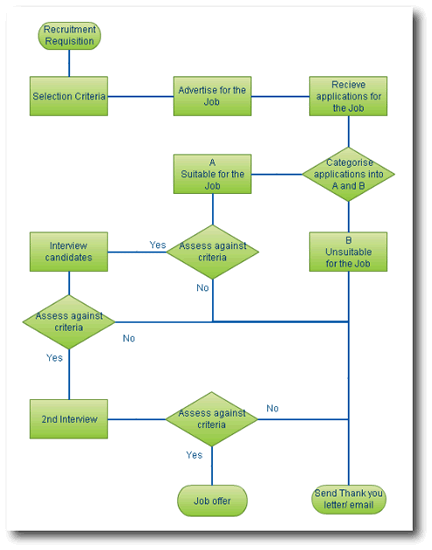
 Writing for the Internet
Writing for the Internet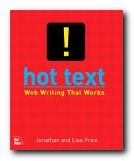 Hot Text: Web Writing that Works
Hot Text: Web Writing that Works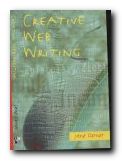 Creative Web Writing
Creative Web Writing Doing Your Research Project: A Guide for First-Time Researchers in Education and Social Science is a best-selling UK guide which covers planning and record-keeping, interviewing, reviewing ‘the literature’, questionnaires, and writing the final report. Even if you are studying a subject other than education or social science, this is a wonderfully helpful guide on organising your ideas and your writing at research level. It’s a model of clarity and good sense. Now in its third edition – and deservedly so. Highly recommended.
Doing Your Research Project: A Guide for First-Time Researchers in Education and Social Science is a best-selling UK guide which covers planning and record-keeping, interviewing, reviewing ‘the literature’, questionnaires, and writing the final report. Even if you are studying a subject other than education or social science, this is a wonderfully helpful guide on organising your ideas and your writing at research level. It’s a model of clarity and good sense. Now in its third edition – and deservedly so. Highly recommended.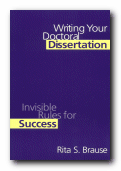 Writing your Doctoral Dissertation: Invisible Rules for Success is a US guide to writing at post-graduate level which uses practical examples, is strong on planning, and offers advice on negotiating the process of research – from making an application to submitting a dissertation. It’s also good on the issue of selecting a research topic and developing it into a feasible project. One of the features which has made this a popular choice is that it offers tips from former students on the problems they have faced in doing research – and how they have overcome them.
Writing your Doctoral Dissertation: Invisible Rules for Success is a US guide to writing at post-graduate level which uses practical examples, is strong on planning, and offers advice on negotiating the process of research – from making an application to submitting a dissertation. It’s also good on the issue of selecting a research topic and developing it into a feasible project. One of the features which has made this a popular choice is that it offers tips from former students on the problems they have faced in doing research – and how they have overcome them. If you have any serious intention of preparing text for publication, then Copy-Editing: The Cambridge Handbook for Editors, Authors and Publishers is your encyclopedia on typography, style, and presentation. It has become the classic UK guide and major source of reference for all aspects of editing and text-presentation, covering every possible bibliographic detail. It also covers a wide range of subjects – from languages to mathematics and music – as well as offering tips on copyright and preparing text for electronic publication.
If you have any serious intention of preparing text for publication, then Copy-Editing: The Cambridge Handbook for Editors, Authors and Publishers is your encyclopedia on typography, style, and presentation. It has become the classic UK guide and major source of reference for all aspects of editing and text-presentation, covering every possible bibliographic detail. It also covers a wide range of subjects – from languages to mathematics and music – as well as offering tips on copyright and preparing text for electronic publication.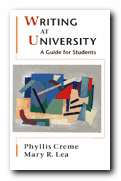 Writing at University: a guide for students is a popular UK guide to understanding questions, planning assignments, reading and note-taking, and developing arguments. It puts a lot of emphasis on the process which leads up to the act of writing, and tries to show you how to develop more confidence. Different types of writing are discussed, as well as the important skill of matching your writing to the conventions of the discipline you are studying. The approach is like that of a sympathetic counsellor.
Writing at University: a guide for students is a popular UK guide to understanding questions, planning assignments, reading and note-taking, and developing arguments. It puts a lot of emphasis on the process which leads up to the act of writing, and tries to show you how to develop more confidence. Different types of writing are discussed, as well as the important skill of matching your writing to the conventions of the discipline you are studying. The approach is like that of a sympathetic counsellor.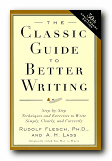 The Classic Guide to Better Writing is more-or-less what its title suggests. It’s a best-selling US guide with emphasis on how to generate, plan, and structure your ideas. It also covers basic grammar, good style, and common mistakes. The approach is step-by-step explanations on each topic, plenty of good advice on how to avoid common mistakes, and tips on how to gain a reader’s attention. Suitable for all types of writing, it well deserves its good reputation.
The Classic Guide to Better Writing is more-or-less what its title suggests. It’s a best-selling US guide with emphasis on how to generate, plan, and structure your ideas. It also covers basic grammar, good style, and common mistakes. The approach is step-by-step explanations on each topic, plenty of good advice on how to avoid common mistakes, and tips on how to gain a reader’s attention. Suitable for all types of writing, it well deserves its good reputation. If you need just one book which will answer all your questions on writing – from punctuation to publication – then this is it. The Little, Brown Handbook is an encyclopaedic US guide to all aspects of writing. It includes vocabulary, punctuation, grammar, style, document design, MLA conventions, editing, bibliography, and the Internet. All topics are profusely illustrated and cross-indexed, and some of the longer entries are virtually short essays. It also has self-assessment exercises so that you can check that you have understood the contents of each chapter. The Swiss army penknife of writing guides. Highly recommended.
If you need just one book which will answer all your questions on writing – from punctuation to publication – then this is it. The Little, Brown Handbook is an encyclopaedic US guide to all aspects of writing. It includes vocabulary, punctuation, grammar, style, document design, MLA conventions, editing, bibliography, and the Internet. All topics are profusely illustrated and cross-indexed, and some of the longer entries are virtually short essays. It also has self-assessment exercises so that you can check that you have understood the contents of each chapter. The Swiss army penknife of writing guides. Highly recommended. Hart’s Rules for Compositors and Readers at the University Press Oxford This is a UK classic guide to the finer points of editing and print preparation, spelling and typography. It was first written as the style guide for OUP, but quickly established a reputation well beyond. There’s no hand-holding here. Everything is pared to the bone. the centre of the book deals with ‘difficult’ and irregular spellings. A masterpiece of compression, it is now in its thirty-ninth edition. This is one for professionals rather than student writers.
Hart’s Rules for Compositors and Readers at the University Press Oxford This is a UK classic guide to the finer points of editing and print preparation, spelling and typography. It was first written as the style guide for OUP, but quickly established a reputation well beyond. There’s no hand-holding here. Everything is pared to the bone. the centre of the book deals with ‘difficult’ and irregular spellings. A masterpiece of compression, it is now in its thirty-ninth edition. This is one for professionals rather than student writers. The Oxford Dictionary for Writers & Editors . This is a specialist dictionary for writers, journalists, and text-editors. Unlike most dictionaries, it does not offer explanations of the words meanings. It deals with problematic English and foreign words, offering correct spellings and consistent usage in the OUP house style. By concentrating on difficult cases, it saves you a lot of time. The latest edition also includes American spellings. Strongly recommended.
The Oxford Dictionary for Writers & Editors . This is a specialist dictionary for writers, journalists, and text-editors. Unlike most dictionaries, it does not offer explanations of the words meanings. It deals with problematic English and foreign words, offering correct spellings and consistent usage in the OUP house style. By concentrating on difficult cases, it saves you a lot of time. The latest edition also includes American spellings. Strongly recommended. The Elements of Style. This is an old favourite – a ‘bare bones’ guidance manual which cuts out everything except the essential answers to the most common writing problems. It covers the elements of good usage, how to write clearly, commonly misued words and expressions, and advice on good style. The emergency first-aid kit of writing guides. It’s very popular, not least because it’s amazingly cheap. Suitable for beginners. There’s an online version available if you do a search – but the cost of a printed version will pay dividends.
The Elements of Style. This is an old favourite – a ‘bare bones’ guidance manual which cuts out everything except the essential answers to the most common writing problems. It covers the elements of good usage, how to write clearly, commonly misued words and expressions, and advice on good style. The emergency first-aid kit of writing guides. It’s very popular, not least because it’s amazingly cheap. Suitable for beginners. There’s an online version available if you do a search – but the cost of a printed version will pay dividends.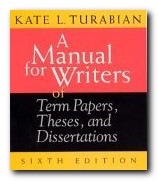 A Manual for Writers of Term Papers, Theses, and Dissertations. This is a modern American classic guidance manual for academic writing. It covers everything from abbreviations and numbers to referencing and page layout. It also includes sections showing how to lay out tables and statistics; lots on bibliographic referencing; and how to deal with public and government documents. The latest edition also includes advice on word-processing.
A Manual for Writers of Term Papers, Theses, and Dissertations. This is a modern American classic guidance manual for academic writing. It covers everything from abbreviations and numbers to referencing and page layout. It also includes sections showing how to lay out tables and statistics; lots on bibliographic referencing; and how to deal with public and government documents. The latest edition also includes advice on word-processing. Style: Ten Lessons in Clarity and Grace. This is a popular guide – particularly amongst creative writing enthusiasts. It offers advice for improving your writing – by putting its emphasis on editing for clarity, creating structure, and keeping the audience in mind. These lessons are useful for all types of writing however. It has plenty of illustrative examples and exercises, an appendix with advice on punctuation, and a good glossary. Recommended.
Style: Ten Lessons in Clarity and Grace. This is a popular guide – particularly amongst creative writing enthusiasts. It offers advice for improving your writing – by putting its emphasis on editing for clarity, creating structure, and keeping the audience in mind. These lessons are useful for all types of writing however. It has plenty of illustrative examples and exercises, an appendix with advice on punctuation, and a good glossary. Recommended.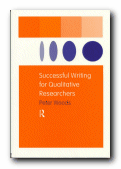 Successful Writing for Qualitative Researchers. This is one for specialist academic writing at post-graduate level. It covers all the stages of creating a scholarly piece of work – from the preparation of a project through to the completion and possible publication of the finished article. Includes sections on style, editing, and collaborative writing. It takes a positive and encouraging tone – which will be welcome to those embarking on such tasks for the first time.
Successful Writing for Qualitative Researchers. This is one for specialist academic writing at post-graduate level. It covers all the stages of creating a scholarly piece of work – from the preparation of a project through to the completion and possible publication of the finished article. Includes sections on style, editing, and collaborative writing. It takes a positive and encouraging tone – which will be welcome to those embarking on such tasks for the first time.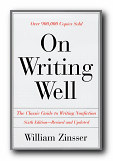 On Writing Well. This is a best-selling title, now in its sixth edition. It offers reassuring guidance from an experienced journalist on writing more effectively in a number of genres. He covers interviews, travel writing, memoirs, sport, humour, science and technology, and business writing. The approach is to take a passage and analyse it, showing how and why it works, or where it might be improved. It is particularly good on editing and re-writing.
On Writing Well. This is a best-selling title, now in its sixth edition. It offers reassuring guidance from an experienced journalist on writing more effectively in a number of genres. He covers interviews, travel writing, memoirs, sport, humour, science and technology, and business writing. The approach is to take a passage and analyse it, showing how and why it works, or where it might be improved. It is particularly good on editing and re-writing.